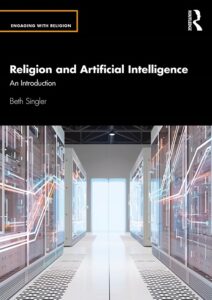Print Matters: Religion and Artificial Intelligence. An Introduction
Beth Singler (Zurich) wrote a fascinating book about religion and artificial intellingence. How do they interrelate? What can we expect in the future? Read here the interview we had with her in our Print Matters series.
- Thank you for this interview, Beth. In the introduction of your book, you write: “There was and always has been, a connection between religion and renewable energy. Between religion and technology. And now, between religion and AI.” How do you see this relationship between religion and AI nowadays?
The connection is a very complex one. I usually refer to religion and AI as being ‘entangled’ with each other, rather than being in a single or simple kind of relationship. And that complexity leads to so many obvious and less obvious outcomes and objects.
In some cases, it’s obvious where religion and AI are meeting and changing each other; in the adoption of AI technologies by established religions for projects and performances. Some also want to use the technology to start a conversation with their members on the societal changes being brought about by AI (and generative AI in particular). Then there are the more implicit entanglements. The moments when we (both the religious and the non-religious) search for ways to explain AI and its impact and instinctively draw on religious images, narratives, and tropes. As when AI is described as ‘god-like’. When it is an object of reverence and utopian hopes. But also, when we fear AI as a wrathful deity that will turn against us when it is smart enough to see humans as unnecessary or dangerous.
- Can you give an example of how religions can adopt AI?
Established religions involve people who want to play with shiny new technologies as much as the rest of us. Some of them also want to seriously explore how generative AI can be used to replicate some of the religious functions that humans have been, so far, uniquely able to serve. And the implications of that automation of the spiritual. So, for instance, the Church in Nuremburg last year that had a GPT created sermon. Or the religions experimenting with AI avatars of their significant religious figures; fed with their religious texts and answering people’s questions on the meaning of life. There are issues and risks involved with such uses, but they certainly inspire conversations.
- How can religions adapt to AI?
Adaptation can be a subtle process. We are changing sometimes before we even know that we are changing. But with AI we are already seeing people adjusting a different way of getting answers, of being creative, and even a different way of seeing the world. Religions as institutions exist in the same environment of social and cultural change – the post-AI world we are living in. Already they have had to adjust to being in new online spaces during Covid, but also, they are being shaped by the impact of algorithms behind the scenes as well as people’s more obvious engagement of AI as a source of religious information. Religious might also start to adjust their spiritual positions in the light of people’s concerns and enthusiasms. Back in 2016, when I started working more specifically on AI and religion, there were already conversations about the theological implications of person-like AIs. Science fiction had prepared people for some of these conversations, such as Asimov’s Bicentennial Man or Star Trek’s Commander Data. But religious figures were also exploring whether established ideas about who can be a believer might also change. Its not a finished conversation, though, by any means!
- How do you envision the future of religious studies, whereby AI will play a growing role?
There are practical applications of AI that both scholars and students in religious studies are already exploring. For instance, using generative AI to analyze religious texts and their origins, or experimenting with generative AI for creating new religious images and then critiquing them and the ethical issues in their production. There are also claims that new pedagogical methods will emerge with AI more generally: new structures and paths for personalized learning or personalized teaching avatars that remove human teachers from the classroom… However, I do also think it is important for the field of religious studies to think about how AI itself fits within our understanding of what religion is. Not only because there are explicitly religious interpretations of AI out there in specific new religious movements, but also because our aspirations for AI can be seen through a religious studies lens to make sense of the cultural changes we are living through with this new technology. Even the religious studies approach to disappointed prophetic communities might have something valuable to say if AI does not live up to the hype! We will see topics and methods impacted by AI in the study of religion, now and in the future.
***
About Beth Singler

Beth Singler is the Assistant Professor in Digital Religion(s) and co-leader of the Media Existential Encounters and Evolving Technology Lab, at the University of Zurich. Beth is an anthropologist of AI, religion, technology, and culture, and she has also won awards for her public engagement work on AI ethics and her digital religion research.
About the book
About Print Matters
RESILIENCE is unique, also in the sense that it focuses on both digital and physical data such as manuscripts, letters, books, etc. Physical sources remain essential for the study of religion and so are printed books for the communication of research on religion. In Print Matters we present recent academic books in the field of the study of religion, books on relevant topics with an innovative approach.
